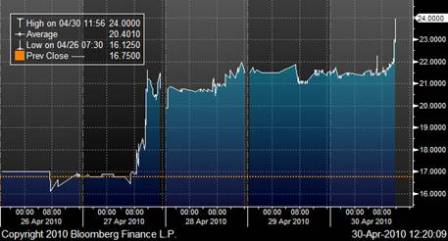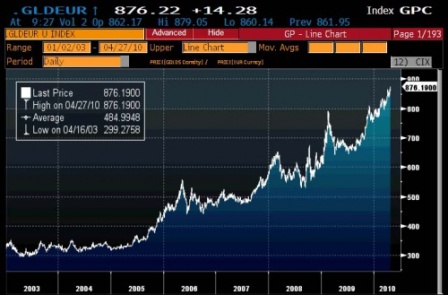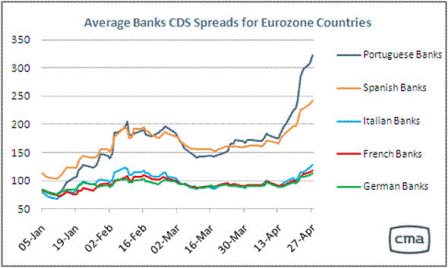>
> (email exchange)
>
> On Thu, Apr 15, 2010 at 3:29 PM, John wrote:
>
> Warren, I can’t tell from this article if the European Central Bank is
> issuing new currency in exchange for national government bonds or not?
>
This in fact is a very good article.
Yes, the ECB is funding its banks, and yes, they do accept the securities of the member nations as collateral.
However that funding is full recourse. If the bonds default the banks that own the securities take the loss.
The reason a bank funds its securities and other assets at the Central Bank is price. Banks fund themselves where they
are charged the lowest rates. And the Central Bank, the ECB in this case, sets the interbank lending rate by offering funds at its
target interest rate, as well as by paying something near it’s target rate on excess funds in the banking system. That is, through its various ‘intervention mechanisms’ the ECB effectively provides a bid and an offer for interbank funds.
In the banking system, however, loans ‘create’ deposits as a matter of accounting, so the total ‘available funds’ are always equal to the total funding needs of the banking system, plus or minus what are called ‘operating factors’ which are relatively small. These include changes in cash in circulation, uncleared checks, changes in various gov. account balances, etc.
This all means the banking system as a whole needs little if any net funding from the ECB. However, any one bank might need substantial funding from the ECB should other banks be keeping excess funds at the ECB. So what is happening is that banks who are having difficulty funding themselves at competitive rates immediately use the ECB for funding by posting ‘acceptable collateral’ to fund at that lower rate.
One reason a bank can’t get ‘competitive funding’ in the market place is its inability to attract depositors, generally due to risk perceptions. While bank deposits are insured, they are insured only by the national govts, which means Greek bank deposits are insured by Greece. So as Greek and other national govt. solvency comes into question, depositors tend to avoid those institutions, which drives them to fund at the ECB. (actually via their national cb’s who have accounts at the ECB, which is functionally the same as funding at the ECB)
As with most of today’s banking systems, liabilities are generally available in virtually unlimited quantities, and therefore regulation falls entirely on bank assets and capital considerations. As long as national govt securities are considered ‘qualifying assets’ and banks are allowed to secure funding via insured deposits of one form or another and the return on equity is competitive there is no numerical limit to how much the banking system can finance.
So in that sense the EU is in fact financially supporting unlimited credit expansion of the national govts. They know this, but don’t like it, as the moral hazard issue is extreme. Left alone, it becomes a race to the bottom where the national govt with the most deficit spending ‘wins’ in real terms even as the value of the euro falls towards 0. When the national govts were making ‘good faith efforts’ to contain deficits, allowing counter cyclical increases through ‘automatic stabilizers’ and not proactive increases, it all held together. However what Greece and others appear to have done is ‘call the bluff’ with outsize and growing deficits and debt to gdp levels, threatening the start (continuation?) of this ‘race to the bottom’ if they are allowed to continue.
The question then becomes how to limit the banking system’s ability to finance unlimited national govt. deficit spending. Hence talk of Greek securities not being accepted at the ECB. Other limits include the threat of downgraded bonds forcing banks to write down their capital and threaten their solvency. And once the banking system reaches ‘hard limits’ to what they can fund a system that’s already/necessarily a form ‘ponzi’ faces a collapse.
The other problem is that when the euro was on the way up due to portfolio shifts out of the dollar, many of those buyers of euro had to own national govt paper, as their is nothing equiv. to US Treasury securities or JGB’s, for example. That helped fund the national govs at lower rates during that period. That portfolio shifting has largely come to an end, making national govt funding more problematic.
The weakening euro and rising oil prices raises the risk of ‘inflation’ flooding in through the import and export channels. With a weak economy and national govt credit worthiness particularly sensitive to rising interest rates, the ECB may find itself in a bind, as it will tend to favor rate hikes as prices firm, yet recognize rate hikes could cause a financial collapse. And should a govt like Greece be allowed to default the next realization could be that Greek depositors will take losses, and, therefore, the entire euro deposit insurance lose credibility, causing depositors to take their funds elsewhere. But where? To national govt. or corporate debt? The problem is there is nowhere to go but actual cash, which has been happening. Selling euro for dollars and other currencies is also happening, weakening the euro, but that doesn’t reduce the quantity of euro deposits, even as it drives the currency down, though the ‘value’ of total deposits does decrease as the currency falls.
It’s all getting very ugly as it all threatens the value of the euro. The only scenario that theoretically helps the value of the euro is a national govt default, which does eliminate the euro denominated financial assets of that nation, but of course can trigger a euro wide deflationary debt collapse. The ‘support’ scenarios all weaken the euro as they support the expansion of euro denominated financial assets, to the point of triggering the inflationary ‘race to the bottom’ of accelerating debt expansion.
Bottom line, it’s all an ‘unstable equilibrium’ as we used to say in engineering classes 40 years ago, that could accelerate in either direction. My proposal for annual ECB distributions to member nations on a per capita basis reverses those dynamics, but it’s not even a distant consideration.
Where are ‘market forces’ taking the euro? Low enough to increase net exports sufficiently to supply the needed net euro financial assets to the euro zone, which will come from a drop in net financial assets of the rest of world net importing from the euro zone. This, too, can be a long, ugly ride.
As a final note, the IMF gets its euros from the euro zone, so using the IMF changes nothing.
Comments welcome!
By Peter Boone and Simon Johnson
Peter Boone is chairman of the charity Effective Intervention and a research associate at the Center for Economic Performance at the London School of Economics. He is also a principal in Salute Capital Management Ltd. Simon Johnson, the former chief economist at the International Monetary Fund, is the co-author of 13 Bankers.
April 15 (NYT) — The bailout of Greece, while still not fully consummated, has brought an eerie calm in European financial markets.
It is, for sure, a huge bailout by historical standards. With the planned addition of International Monetary Fund money, the Greeks will receive 18 percent of their gross domestic product in one year at preferential interest rates. This equals 4,000 euros per person, and will be spent in roughly 11 months.
Despite this eye-popping sum, the bailout does nothing to resolve the many problems that persist. Indeed, it probably makes the euro zone a much more dangerous place for the next few years.
Next on the radar will be Portugal. This nation has largely missed the spotlight, if only because Greece spiraled downward. But both are economically on the verge of bankruptcy, and they each look far riskier than Argentina did back in 2001 when it succumbed to default.
Portugal spent too much over the last several years, building its debt up to 78 percent of G.D.P. at the end of 2009 (compared with Greece’s 114 percent of G.D.P. and Argentina’s 62 percent of G.D.P. at default). The debt has been largely financed by foreigners, and as with Greece, the country has not paid interest outright, but instead refinances its interest payments each year by issuing new debt. By 2012 Portugal’s debt-to-G.D.P. ratio should reach 108 percent of G.D.P. if the country meets its planned budget deficit targets. At some point financial markets will simply refuse to finance this Ponzi game.
The main problem that Portugal faces, like Greece, Ireland and Spain, is that it is stuck with a highly overvalued exchange rate when it is in need of far-reaching fiscal adjustment.
For example, just to keep its debt stock constant and pay annual interest on debt at an optimistic 5 percent interest rate, the country would need to run a primary surplus of 5.4 percent of G.D.P. by 2012. With a planned primary deficit of 5.2 percent of G.D.P. this year (i.e., a budget surplus, excluding interest payments), it needs roughly 10 percent of G.D.P. in fiscal tightening.
It is nearly impossible to do this in a fixed exchange-rate regime — i.e., the euro zone — without vast unemployment. The government can expect several years of high unemployment and tough politics, even if it is to extract itself from this mess.
Neither Greek nor Portuguese political leaders are prepared to make the needed cuts. The Greeks have announced minor budget changes, and are now holding out for their 45 billion euro package while implicitly threatening a messy default on the rest of Europe if they do not get what they want — and when they want it.
The Portuguese are not even discussing serious cuts. In their 2010 budget, they plan a budget deficit of 8.3 percent of G.D.P., roughly equal to the 2009 budget deficit (9.4 percent). They are waiting and hoping that they may grow out of this mess — but such growth could come only from an amazing global economic boom.
While these nations delay, the European Union with its bailout programs — assisted by Jean-Claude Trichet’s European Central Bank — provides financing. The governments issue bonds; European commercial banks buy them and then deposit these at the European Central Bank as collateral for freshly printed money. The bank has become the silent facilitator of profligate spending in the euro zone.
Last week the European Central Bank had a chance to dismantle this doom machine when the board of governors announced new rules for determining what debts could be used as collateral at the central bank.
Some anticipated the central bank might plan to tighten the rules gradually, thereby preventing the Greek government from issuing too many new bonds that could be financed at the bank. But the bank did not do that. In fact, the bank’s governors did the opposite: they made it even easier for Greece, Portugal and any other nation to borrow in 2011 and beyond. Indeed, under the new lax rules you need only to convince one rating agency (and we all know how easy that is) that your debt is not junk in order to get financing from the European Central Bank.
Today, despite the clear dangers and huge debts, all three rating agencies are surely scared to take the politically charged step of declaring that Greek debt is junk. They are similarly afraid to touch Portugal.
So what next for Portugal?
Pity the serious Portuguese politician who argues that fiscal probity calls for early belt-tightening. The European Union, the European Central Bank and the Greeks have all proven that the euro zone nations have no threshold for pain, and European Union money will be there for anyone who wants it. The Portuguese politicians can do nothing but wait for the situation to get worse, and then demand their bailout package, too. No doubt Greece will be back next year for more. And the nations that “foolishly” already started their austerity, such as Ireland and Italy, must surely be wondering whether they too should take the less austere path.
There seems to be no logic in the system, but perhaps there is a logical outcome.
Europe will eventually grow tired of bailing out its weaker countries. The Germans will probably pull that plug first. The longer we wait to see fiscal probity established, at the European Central Bank and the European Union, and within each nation, the more debt will be built up, and the more dangerous the situation will get.
When the plug is finally pulled, at least one nation will end up in a painful default; unfortunately, the way we are heading, the problems could be even more widespread.





